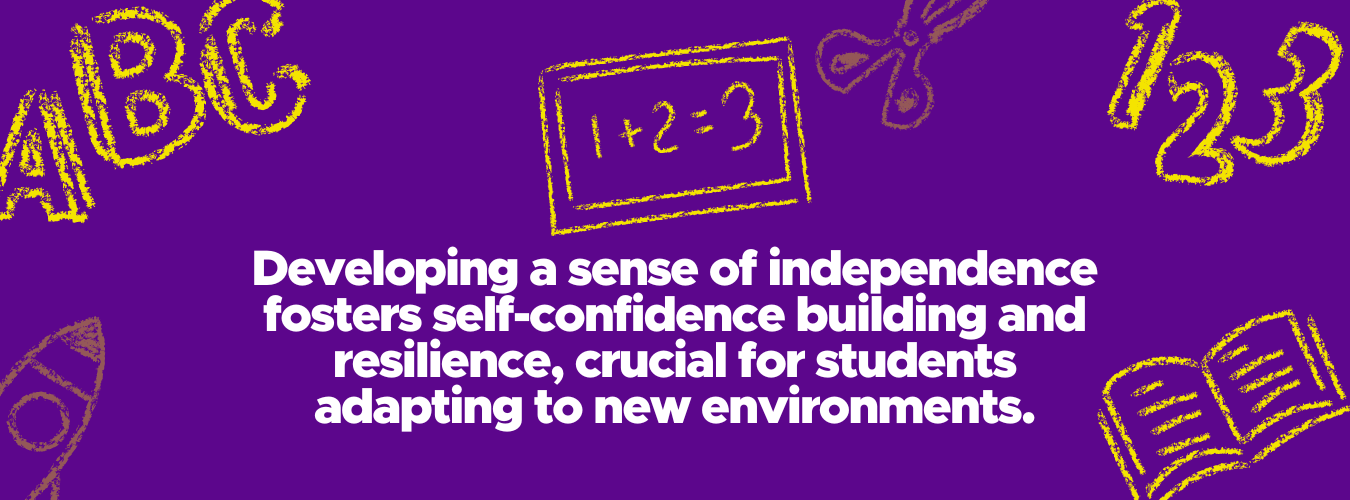Tips for Adjusting to a New School

Starting at a new school can be nerve-wracking, even for the most confident and resilient children. It’s normal for children to feel a mix of nerves and excitement when moving schools or starting a new school level.
Whether your family has moved to a new area and your children are being relocated to a new school, or if your child is moving on to the next year's level at a new school, these tips for adjusting to a new school can help.
It’s important during the first week of this transitionary period to make your child feel comfortable and confident in their abilities to adapt to their new school environment. With the right support, your child will be feeling at home at their new school in no time!
Foster Open Communication
Encourage your child to express their thoughts and feelings about the new school openly. Create a safe space where they can share their concerns or excitement. Regularly check in with them about their day, their interactions with classmates, and any challenges they may be facing. Open communication will help you stay informed about their experiences and allow you to address any issues promptly.
If your child is hesitant to talk, consider using creative methods like drawing or journaling to help them express themselves. Additionally, establish a communication channel with your child and their teachers to stay updated on your child's academic progress and any social dynamics within the classroom.

Prepare Well
To give your child the best chance at adjusting to their new school, help them prepare well. Preparation includes scouting out the school ahead of time and exploring the route to school.
Ensure you allocate ample time to reach school on the first day, alleviating any concerns about lateness. The night before is important too. Ensure the entire family is well-rested, lunches are prepared, uniforms are set out, and breakfast is prepared for the morning. The importance of ample sleep and healthy food cannot be overstressed in feeling prepared to tackle the commencement of the school day!
Combat Anxiety
If your child is nervous about starting at a new school, figure out what is causing their nerves, and help them relax. Anxiety can be reduced by being well prepared, so make sure your child has all of the school supplies they need, as well as a clear idea of what their first day will look like.
Having a day plan or a class timetable can help alleviate nerves, as can knowing new students and their classrooms and teacher's names, and having a way to have graduate students contact you if they need to. Preparation can provide children with a sense of confidence, making them feel comfortable about their new friends and adjusting to their new school. Keep checking in with your child about how they are feeling, and if anxiety about school continues, reach out to their teacher as a first step.

Make your Child Feel Comfortable
Adjusting to a new school can take time. Your child may be faced with catching a bus for the first time, leaving behind old friends, studying new subjects, or even taking exams. On their first day, take them to school if you can. Depending on their age, you might go into their classroom and meet the teacher.
This is a good opportunity to let the teacher know any important information about your child and arrange a communication channel to move forward with. Having an easy way to contact your child’s teacher will make you feel comfortable too. Taking an active role in helping new teachers and your child settle into new schools will put you both at ease.
Set a Routine
Routines make life easier. When we know what to expect from our days, we can prepare accordingly and tackle challenges and tasks one at a time. Setting a daily routine for your children will help them plan their time and understand their daily commitments.
For this school year, establish a clear routine encompassing wake-up time, breakfast, the commute to school, after-school activities, the journey back home, homework time, and bedtime. Tailor the routine based on your child's key daily activities, such as catching the bus, attending football practice, or participating in after-school tutoring. To assist your children in managing their time and prioritising their favourite activities, consider creating a whiteboard timetable or printing out a calendar that outlines your family's weekly schedule.

Celebrate Achievements
Acknowledge and celebrate your child's achievements, no matter how small. Recognising their efforts and successes, whether academically, socially, or in extracurricular activities and community activities, boosts their self-esteem and motivates them to continue adapting positively to the new school environment.
Create a system of rewards or special treats for kids accomplishing specific goals or overcoming challenges. By focusing on their achievements, you reinforce building their skills and creating a positive mindset and help them build resilience in the face of new experiences.
Encourage Independence
Empower your child to take ownership of their new school journey. Encourage them to manage their school supplies, navigate their schedule, and take responsibility for their homework. Developing a sense of independence fosters self-confidence building and resilience, crucial attributes for students adapting to new environments.
By incrementally assigning more responsibilities, students can be better equipped to face the demands of a more self-reliant academic journey. This process might include allowing students to manage tasks such as organising their backpacks, planning their study schedules, and directly communicating with teachers when needed.

Get Involved in Extracurricular Activities
Joining a club or sports team is a great way to meet and connect with new people. Making friends outside of the classroom will help broaden your child’s social group and could even lead to uncovering new interests or talents! Make sure you receive the school handbook and sit down with your child to look through the options for extracurricular activities.
They might have an interest in learning an instrument and joining the school orchestra, or signing up for athletics. Whatever their interests, encourage them to join a club or team, and get outside of their comfort zone. You can also review the school calendar and take note of upcoming classes, activities and events that the school faculty or community hosts. If you can, attend some school or community events with your family!
Starting a new school can be daunting, but with the right preparation and support, your child will take on the challenge with confidence. If you are concerned about your child’s progress at school, or they aren’t keeping up with their peers in class, get in touch with your local NumberWorks’nWords centre to book a free assessment.
Our comprehensive assessment process uncovers gaps and weaknesses in students and forms a personalised learning programme for each child. Learn more about English and maths tutoring with NumberWorks’nWords by contacting your local centre.




